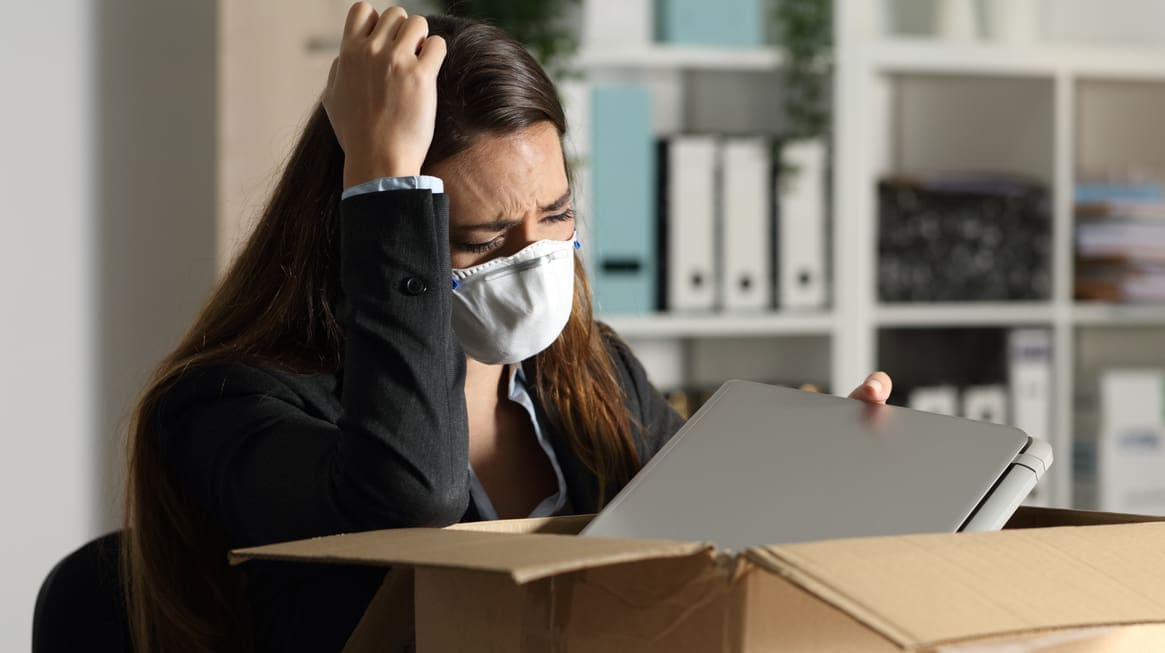In an era colored by pandemic, millions of people have taken to worrying for their safety and the safety of their loved ones daily. But while the coronavirus has undoubtedly shaped the conversation surrounding physical health, it’s taken a sizable toll on mental health as well. When it comes to covid, depressed individuals have manifold struggles. People’s personal and professional lives have been and continue to alter in unimaginable ways.
From healthcare workers on the front lines to breadwinners trying to make ends meet in an unforgiving economy, depression in the workplace is running rampant. Continue reading to discover how to administer self-care while on—and off—the job.
Depression, the Workplace and COVID-19
After a long and draining year in isolation, it’s no surprise that many individuals are experiencing the onset of depression for the first time in their lives. In a telecommunications culture, more and more people struggle to find a balance between their personal and professional lives, further exacerbating the complexity of preexisting mental health conditions.
Today, hundreds of studies are espousing strong links between the rise of depression and COVID-19. Moreover, unemployment levels have skyrocketed far beyond typical national averages; with rising unemployment, individuals are far more likely to shoulder emotional baggage filled with shame and guilt.
Even if you may not be struggling with depression personally, it’s statistically likely that one in five people around you have or will experience depression at some point in their lives. Knowing how to identify the telltale warning signs—sudden changes in upbeat demeanor, increased absenteeism, decreased participation—is key to combating depression and its societal stigmas. Support can begin with you and your colleagues at your place of work.
Working Through Covid: Depressed but Functioning
COVID-19 changed everything about the inner workings of our daily lives and routines; it’s clinically proven that such drastic upheaval is registered in both the body and the mind. But when it comes to COVID, depressed individuals must find ways to work around their mental health to make a living and support themselves financially. Here are a few methodologies and strategies that may help you find mental balance while on the clock or searching for new employment opportunities.
Stay Consistent
Work may even provide a valuable sense of purpose and security amid so much external uncertainty. “Big changes in your routine can make you feel out of balance, anxious, and impact your mood in a negative way,” explains behavioral health expert Marjorie Pierce, “[that’s why] it is important that you keep your routine as close to usual as possible.”
Be Patient With Yourself
When it comes to depression, patience is key; while episodic depressive flare-ups tend to fluctuate in severity and frequency, true healing takes time, and progress is never quite linear. Achieve TMS accurately posits that “it’s important to understand that dealing with depression is a job in and of itself, and it’s a feat to work against your depression and continue to earn money in some capacity.”
Normalize Patterns of Sleep and Physical Activity
When it comes to depression, the mind and the body are inextricably linked and depend on one another to maintain total health. Regular sleep and physical activity instances create positive feedback loops that reinforce one another and help exponentially during the healing process. Exercise releases endorphins and improves self-esteem, while REM sleep stabilizes mood and alleviates fatigue.
Break Up Workloads
People struggling with depression may feel overwhelmed by large workloads while lacking their normal levels of energy and willpower. Itemizing small tasks within more significant projects and interspersing short breaks between these tasks will help bolster feelings of accomplishment and strategic energy use.
Say No
Even though consistent work can sometimes help fortify a routine, sometimes it has the opposite effect—those who work too hard to stave off their depression will ultimately suffer the consequences. The practices of saying no, delegating to one’s peers, and/or taking a temporary leave of absence are important tools to keep in mind.
Healing From COVID-19 Related Depression
Even though it’s possible to perform in the workplace despite one’s depression, healing, in general, should always remain the root priority. Recovering from COVID-19 related depression should occur throughout multiple conduits to provide maximum support to afflicted individuals. Both interpersonal and professional help paves the pathway to strong mental resilience.
Interpersonal Support
Interpersonal support is constituted by communication and empathy from family, friends, and coworkers. The National Alliance on Mental Illness (NAMI) suggests that being open with your colleagues will help crystallize the critical fact that “you are managing depression, not losing interest in work.” Managers can broach the subject with employees using a few of these key tactics.
There should always be a space for one-on-one, open conversations in a safe and private setting. Active listening, laughter, and empathy are formidable healing agents.
Professional Support
Even though millions of people suffer from depression, only about a third of those people seek professional help. Professional support can take many shapes depending on unique individual circumstances. Often, those suffering from depression benefit from the help of a personal therapist or psychiatrist should they decide medication is in order. Thousands of providers offer telehealth appointments that ensure the safety of both parties.
In the modern era, new treatments and technologies are constantly arriving through FDA-approved channels. One such effective treatment is transcranial magnetic stimulation (or TMS) which helps to improve energy levels, reduce anxiety, elevate and stabilize mood and enhance overall mental faculties.
Ultimately, spreading out support systems between personal relationships and licensed professionals ensures that the responsibility for someone’s fragile emotional life doesn’t fall too heavily in any one place.
Treat Your COVID-19 Depression With MidCity TMS
During COVID, depressed individuals have been suffering greatly from this formidable affliction, one faced in solidarity by those struggling throughout the nation—and the world at large. The first step to healing from depression almost always involves embracing one singular truth: you don’t have to fight this battle alone.
At MidCity TMS, our mission is to help set you on the path to success, both internally and professionally. Our highly-trained professionals are here to offer patients completely non-invasive, clinically proven TMS treatments that can help alleviate depression in just a few affordable sessions. Contact us today to learn more about how TMS can help you emerge from the COVID-19 era stronger than ever before.



